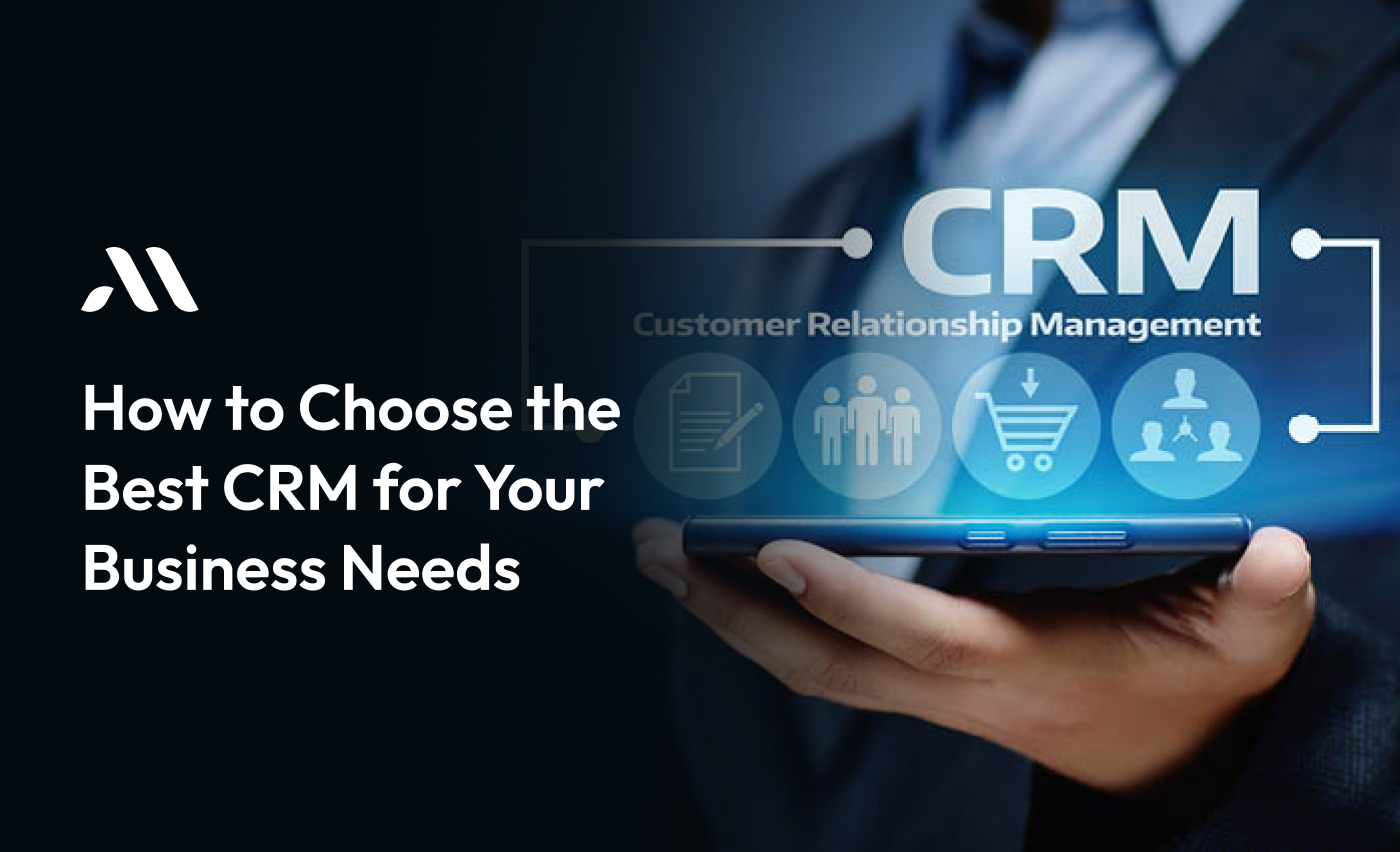In today's digital age, choosing the best Customer Relationship Management (CRM) system for your business is important for success. A CRM tool helps you manage customer interactions, simplify processes, and improve overall efficiency. With so many options available, finding the best CRM software can be strong. This guide will walk you through the process of choosing the best CRM for your business needs, ensuring you make an informed decision that aligns with your goals.
What is CRM?
CRM stands for Customer Relationship Management. It is a technology that helps businesses manage interactions with current and potential customers. A CRM system stores customer data, tracks interactions, and provides information to improve customer relationships.
Why You Need the Best CRM
Investing in the best CRM software is essential for several reasons:
- Improved Customer Relationships: A CRM system helps you to track customer interactions, understand their needs, and provide personalized experiences.
- Increased Efficiency: Automation features in CRM tools simplify processes, saving time and resources.
- Data Centralization: All customer data is stored in one place, making it easier to access and analyze.
- Better Decision Making: Insights provided by CRM software help in making data-driven decisions.
- Scalability: The best CRM tools are scalable, growing with your business and adapting to changing needs.
Key Features to Look for in the Best CRM
When choosing the best CRM for your business, consider the following key features:
- Contact Management: Easily manage customer contact information and interactions.
- Sales Automation: Automate sales processes such as lead management, pipeline tracking, and sales forecasting.
- Marketing Automation: Create targeted marketing campaigns, track results, and analyze campaign performance.
- Customer Support: Provide excellent customer support with ticketing systems, knowledge bases, and customer portals.
- Integration Capabilities: Ensure the CRM tool integrates easily with other software your business uses, such as email marketing tools, accounting software, and e-commerce platforms.
- Reporting and Analytics: Access detailed reports and analytics to measure performance and make informed decisions.
- Mobile Accessibility: Choose a CRM with mobile apps or responsive design for on-the-go access.
Choosing the Best CRM for Your Business
Follow these steps to choose the best CRM for your business needs:
- Define Your Requirements: Identify your business goals, customer management needs, and must-have features.
- Research Options: Research different CRM software options, considering their features, pricing, and user reviews.
- Demo and Trial: Take advantage of demos and free trials to test CRM software before making a decision.
- Scalability: Choose a CRM that can scale with your business as it grows.
- Integration: Ensure the CRM integrates smoothly with your existing software ecosystem.
- Training and Support: Consider the availability of training resources and customer support.
Advanced Features to Consider in CRM Software
When selecting the best CRM software for your business, it's important to know advanced features that can enhance your customer management strategies and overall business operations.
AI and Machine Learning: Many modern CRM tools provide AI and machine learning capabilities. These technologies can analyze customer data, predict trends, and automate processes like lead scoring and personalized recommendations. Implementing AI in your CRM can lead to more accurate information and improved decision-making.
Workflow Automation: Look for CRM software that helps you to automate workflows. This feature simplifies repetitive tasks, such as sending follow-up emails, scheduling appointments, and assigning tasks to team members. By automating these processes, you can save time and ensure consistency in your operations.
Social Media Integration: In today's digital landscape, social media plays an important role in customer engagement. Choose a CRM system that integrates with social media platforms like Facebook, Twitter, and LinkedIn. This integration helps you to track social interactions, monitor brand mentions, and engage with customers across various channels.
Customer Segmentation: Effective customer segmentation is key to providing personalized experiences. A robust CRM tool should help you to make your customer base based on demographics, behavior, purchase history, and other criteria. Targeted marketing campaigns customized to specific customer groups can lead to higher conversion rates and customer satisfaction.
Predictive Analytics: Using predictive analytics in your CRM can help you know customer needs and behavior. By analyzing historical data and trends, predictive analytics can forecast future outcomes, such as sales projections, customer churn rates, and marketing campaign effectiveness. This information helps proactive decision-making and strategic planning.
Mobile CRM: With the rise of remote work and mobile devices, a mobile-friendly CRM is important. Look for CRM software that provides mobile apps or responsive web design. Mobile CRM allows your team to access customer information, manage tasks, and communicate on the go, increasing productivity and flexibility.
Customer Journey Mapping: Mapping the customer journey is important for understanding how customers interact with your business at each touchpoint. Choose a CRM system that helps customer journey mapping, helping you visualize and analyze the whole customer experience. This insight helps you identify pain points, optimize processes, and enhance customer satisfaction.
Integration with Business Intelligence (BI) Tools: Integrating your CRM with BI tools like Tableau, Power BI, or Google Data Studio can provide deep information into your data. BI tools enable advanced analytics, data visualization, and engaging dashboards, helping you to make data-driven decisions and uncover actionable insights.
Customization and Flexibility: Every business has unique processes and requirements. Look for CRM software that provides customization options and flexibility. This includes customizable workflows, fields, and reporting features. A flexible CRM solution can adapt to your evolving business needs and workflows, ensuring maximum efficiency and effectiveness.
Security and Compliance: Data security and compliance are important when choosing a CRM system. Ensure that the CRM software complies with industry standards and regulations, such as GDPR or HIPAA. Look for features like data encryption, access controls, and regular security updates to protect sensitive customer information.
Choosing the Right CRM for Your Business Size and Industry
Consider the size of your business and industry-specific requirements when selecting a CRM system:
Small Businesses: For small businesses, a user-friendly CRM with important features like contact management, lead tracking, and email integration is ideal. Look for affordable options with scalability for future growth.
Midsize Businesses: Midsize businesses may require more advanced features such as workflow automation, customer segmentation, and mobile CRM. Choose a CRM that offers customization, integration, and robust reporting capabilities.
Enterprise-Level Businesses: Large enterprises benefit from CRM systems with enterprise-grade features like AI, predictive analytics, and social media integration. Look for scalable solutions that can handle large volumes of data and support complex workflows.
Integration with Other Business Tools
An easy integration with other business tools is important for improving the efficiency of your CRM system. Consider integrating your CRM with:
Email Marketing Platforms: Syncing your CRM with email marketing platforms like Mailchimp, Constant Contact, or HubSpot helps you to track email interactions, automate campaigns, and measure email performance.
Accounting Software: Integrating CRM with accounting software such as QuickBooks or Xero improve invoicing, payment tracking, and financial reporting.
E-commerce Platforms: CRM integration with e-commerce platforms like Shopify, WooCommerce, or Magento helps to easy order management, customer tracking, and personalized shopping experiences.
Wrap Up
Choosing the best CRM for your business requires careful consideration of advanced features, scalability, integration capabilities, security, and industry-specific needs. By considering these factors and using them with your business goals, you can select a CRM system that empowers you to manage customer relationships effectively, drive sales growth, and achieve business success.
Contact MicraSol LLP for expert guidance on selecting and implementing the best CRM solution for your business.
FAQS
What is a CRM system, and why do I need one for my business?
A CRM (Customer Relationship Management) system is a tool that helps businesses manage customer interactions, store customer data, and simplify processes. It improves customer relationships, increases efficiency, centralizes data, helps in decision-making, and scales with your business as it grows.
How do I know which CRM is the best for my business?
The best CRM for your business depends on your specific needs. Consider your business size, industry requirements, must-have features, and budget. Choose options based on key features like contact management, sales automation, marketing automation, customer support, integration capabilities, reporting, and mobile accessibility.
What are the key features to look for in the best CRM software?
Key features to consider include contact management, sales automation, marketing automation, customer support, integration capabilities, reporting and analytics, mobile accessibility, AI and machine learning, workflow automation, social media integration, customer segmentation, predictive analytics, customer journey mapping, and security and compliance.
How can I ensure that the CRM I choose will grow with my business?
Look for a CRM that is scalable and flexible. It should provide customization options, handle increasing data volumes, and adapt to changing business needs. Choose a CRM with a range of features that can be expanded as your business grows.
What are some popular CRM software options for small businesses?
Some popular CRM software options for small businesses include Salesforce, HubSpot CRM, Zoho CRM, Freshsales, and Pipedrive. These platforms provide user-friendly interfaces, important features, and scalability for future growth.








